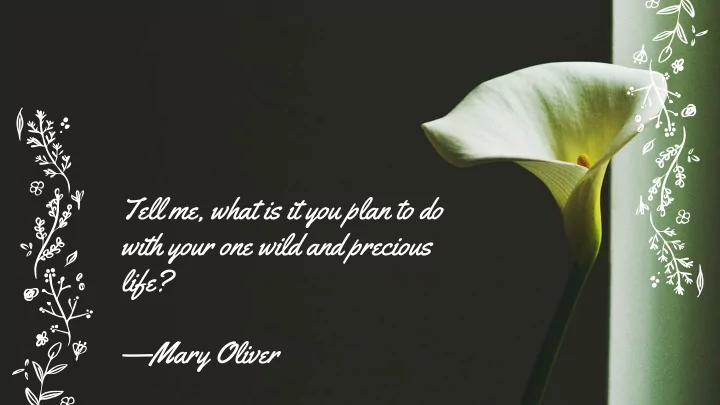

Tell me, what is it you plan to do with your one wild and precious life? —Mary Oliver
Classroom and Teacher Transformation through Mindfulness ALI HERRON Kindergarten Teacher/ Mindfulness Practitioner Marysville Elementary School
Who we are…. Why we are here. 1.) Share your name and job title. 2.) Share your reason for being here.
Hello! I am Ali Herron You can reach me at aherron@pps.net
Marysville School
Defining Mindfulness What do we already know?
“Mindfulness means paying attention in a particular way: on purpose, in the present moment, and nonjudgmentally.” ― Jon Kabat-Zinn
Simply... Choosing to pay attention
Simply... Choosing to to the pay present attention moment
Simply... Choosing to to the as an pay present observer. attention moment
Workshop Format Personal Brain Classroom Practice Science Integration
Participants will be able to Express a personal Name and describe ✢ ✢ understanding of parts of the brain mindfulness Articulate brain-based Utilize sentence ✢ ✢ practices for well-being frames to increase self-regulation
The Practices 1. The Soft Start 2. Keeping the Brain in Mind 3. The Brain Break 4. Emotional Authenticity 5. Practice the Pause 6. Lens of Self-Compassion 7. Gratitude
Practice 1. The Soft Start Begin the day with gentleness and intention
The Soft Start What did you notice upon entering? Calm Connect
This Practice and the Brain: Neurosequential Model in Education (NME) The ChildTrauma Academy childtrauma.org
Classroom Integration ✢ Soft Start Elements ✢ Calm ✢ Connect ✢ Community ✢ Chime
Practice 2. Keeping the Brain in Mind Understanding the parts of your brain
Keeping the Brain in Mind ✢ The brain as a house ✢ Hand model of the brain
This Practice Understanding and the the brain Brain: integrates the brain
Classroom Integration ✢ Teach the hand model of the brain ○ Prefrontal cortex ○ Amygdala ○ Hippocampus ✢ Reinforce during read alouds I am using my .
Practice 3. The Brain Break Focused attention training for all
“One of the primary ironies of modern education is that we ask students to “pay attention” dozens of times a day, yet we never teach them how.” ― Amy Saltzman
The Brain Break Focused attention training in action
This Supports Practice and the functioning of the Brain: prefrontal cortex
Classroom Integration ✢ Teaching the Brain Break ✢ Start small ✢ Focus on the WHY ✢ Expect challenges After brain break I feel .
Practice 4. Emotional Authenticity Acknowledging the range of human emotions
Emotional Authenticity The teacher as an emotional being Poem reading: The Guest House By: Rumi
This Practice “Affect labeling” and the reduces Brain: amygdala activity
Classroom Integration ✢ Sharing our emotions ✢ “Feeling” our feelings ✢ Zones of Regulation I am feeling .
Practice 5. Practice the Pause The difference between reacting and responding
“Between stimulus and response there is a space. In that space is our power to choose our response. In our response lies our growth and our freedom.” ― Viktor Frankl
Practice the Pause The most important mindfulness tool in the kit! Choose to respond rather than react 8 Breaths to Joy practice
This Practice Pausing puts the and the Brain: prefrontal cortex back in control
Classroom Integration ✢ Pause to: ○ notice feelings ○ savor joy ○ question responses ○ breathe I notice .
Practice 6. Lens of Self-Compassion Looking through the lens of universal experience
Lens of Self-Compassion Self Kindness Common Humanity Mindfulness Self-compassion mini-meditation
This Practice Activating our and the Brain: care-giving system releases oxytocin (it works for us, too!)
Classroom Integration ✢ Speak kind words to yourself for all to hear ✢ Model self-compassion in mistake making ✢ Practice Loving-Kindness meditations Everybody feels sometimes.
Practice 7. Gratitude Making what we have enough
Gratitude Practice: Gratitude Circle Name something you are grateful You have the right to pass
This Practice Neurons that and the Brain: fire together wire together.
Classroom Integration ✢ Use perspective-taking to enhance gratitude ✢ Start a gratitude journal ✢ Take it BEYOND November I am grateful for .
Reviewing Objectives Express a personal Name and describe ✢ ✢ understanding of parts of the brain mindfulness Articulate brain-based Utilize sentence ✢ ✢ practices for well-being frames to increase self-regulation
In closing... Jot Down Share 3 practices you are 1 practice you are willing to try willing to try for 7 days in a row
Giveaways Thank you for being here. I appreciate your time and dedication to yourself and your students.
Thanks! Any questions? You can find me at aherron@pps.net
Credits Special thanks to all the people who made and released these awesome resources for free: Presentation template by SlidesCarnival ✢ Photographs by Unsplash ✢ Brain clip art: https://www.lds.org/media-library/images/choose-right-2012-outline-sharing-time-heart-brain-8 ✢ 14134?lang=eng The Neurosequential Model in Education https://www.attach.org/wp-content/uploads/2015/09/NME-Presentation-SPG-0929-comp.pdf ✢ 8 Breaths to Joy Practice https://www.mindful.org/8-breaths-to-joy-a-guided-practice/ ✢ Be Kind to Yourself Meditation https://www.lionsroar.com/meditation-be-kind-to-yourself/ ✢
Recommend
More recommend